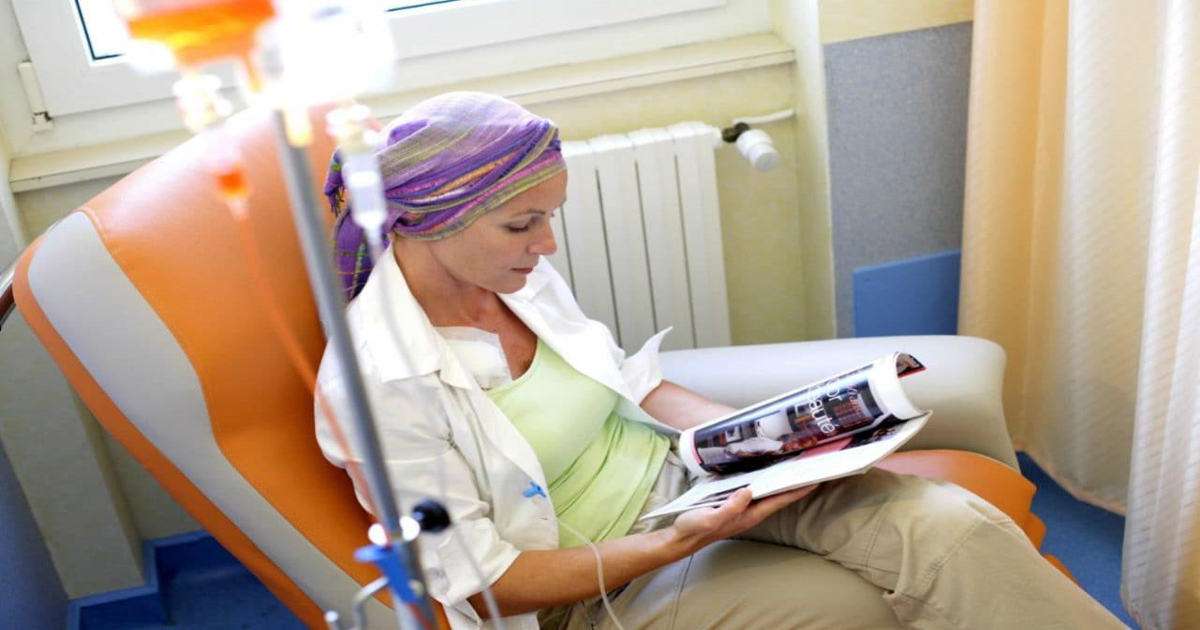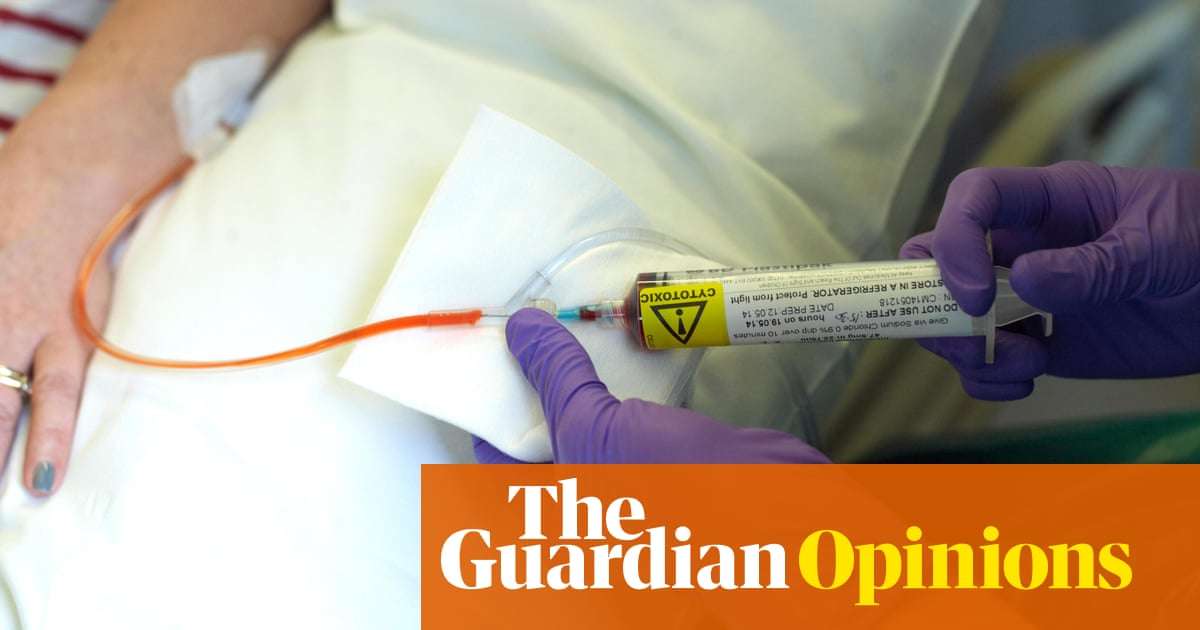Studies On Time To Surgery And Survival
Several studies have been done, but there are some differences in how these were conducted that can affect the results. For example, some studies have looked at the time between a definitive diagnosis and surgery, and others have looked at the time between the onset of symptoms and the time of surgery. Some have looked at averages of all people, whereas others have separated out people based on age, tumor type, and receptor status. Studies can also be skewed, as doctors may recommend surgery sooner for women who have more aggressive tumors. Let’s look at time to surgery and survival rates in different groups of people.
Thousands Could Avoid Chemo
You may have read the news that a ‘test means fewer women will need chemotherapy’.
The news reports follow a study, called TAILORx, of a test widely used on the NHS.
The test Oncotype DX predicts whether someone would benefit from chemotherapy.
The test is suitable for women whose breast cancer:
- is HER2 negative
- hasnt spread to the lymph nodes under the arm
However, there’s a significant grey area of women for whom the benefit is unclear. The researchers looked at this intermediate group. They concluded that for most women in this group over the age of 50, chemotherapy didn’t have any benefit, and hormone therapy alone led to similar survival rates. For some women under 50 in this group, chemotherapy could also be spared.
This means that several thousand women a year could avoid having chemotherapy, which can cause a range of often unpleasant side effects.
You can read a more detailed analysis of the study on the NHS Choices website.
What Are The Side Effects
Chemotherapy is sometimes referred to as a systemic treatment, because it affects all parts of your body. Unfortunately, it can attack fast-growing healthy cells, such as hair follicles, as well as cancer cells. This causes unwanted side effects such as fatigue, nausea and hair loss. Your medical oncologist or oncology nurse can give you information on ways to manage these side effects.
If side effects are affecting your daily life, its important to discuss them with a member of your medical team. In some instances, your oncologist may be able to change your chemotherapy drug to one that has fewer side effects.
Chemotherapy drugs all work differently and have different side effects. Not all women will suffer side effects from chemotherapy. If you dont experience side effects, it does not mean that the drugs aren’t working.
Recommended Reading: Stage Four Breast Cancer Treatment
Chemo And Radiation Do Different Jobs
Chemotherapy is to wipe out cells that are floating around in your blood or lymph and this is a systemic treatment. Radiation is to take care of where the cancer was or is and wipe out the cancer. It is a localized treatment.
You should have both to give yourself the best odds.
Doris
How Do You Know If You Can Skip Chemotherapy

The chemotherapy study results don’t apply to everyone with breast cancer. We’re specifically talking about women who’ve been diagnosed with HER-positive, HER2-negative breast cancer that has not spread to lymph nodes, which is the most common type. Also, the tumor has to have a certain “score” based on a genetic test we perform.
It’s been standard practice to get a small sample of tissue from the tumor and perform genetic testing. The most commonly used test, called Oncotype DX, assesses how likely it is that the tumor will return in the next 10 years.
We’ve known that women whose tumors had a low risk of returning didn’t need chemotherapy. Likewise, we knew that women whose tumors had a high risk of coming back did benefit from chemotherapy.
But for the women whose tumors fell in the middle, we weren’t sure if chemo helped. The research from the TAILORx study now tells us that most women in the intermediate risk group don’t need chemotherapy.
Read Also: Neoplasm Breast Cancer
What Receptor Patterns Suggest Chemotherapy
Your receptor pattern is a key piece of information that comes early in your breast cancer journey. In about 30% of patients with an invasive breast cancer, the receptor pattern alone can strongly suggest that chemotherapy will be needed regardless of what is found at surgery. If your receptor results suggest you will benefit from chemotherapy, you should inquire about the possible benefits of neoadjuvant chemotherapy, meaning chemotherapy given before surgery, not afterwards. The key points regarding receptors are outlined below.
Estrogen Receptor Negative tumors do not respond to anti-estrogen oral medications that are essential in treating estrogen receptor positive tumors. Quite simply, patients with ER negative tumors will benefit from chemotherapy if they are healthy enough to tolerate it. ER negative tumors are more aggressive cancers, but respond more favorably to chemotherapy than ER positive breast cancers.
Progesterone Receptors play a much smaller role than ER or HER2 receptors and are not addressed here.
Triple Negative tumors are fast growing tumors that are usually treated with a specific chemotherapy regimen. These tumors are not responsive to hormonal therapy at all, but may be sensitive to chemotherapy. View our video lesson on Triple Negative Breast Cancer to learn more.
Why Is Chemotherapy Used For Breast Cancer
Not everyone who has breast cancer needs chemotherapy. Depending on the cancer stage, your oncologist may recommend chemotherapy:
- Before surgery : You may have chemotherapy to shrink a tumor. This option could make it possible to have a less-extensive surgery. It may also allow healthcare providers to discover more about the biology of the cancer itself by how it responds to chemotherapy.
- After surgery : Sometimes, cancerous cells remain in your body but dont show up on imaging tests. Your healthcare provider may recommend chemotherapy after surgery to kill any remaining cancer cells. This treatment can also reduce the risk of the cancer from returning .
- For advanced cancer: If breast cancer has spread to other parts of your body , chemotherapy may be the main treatment.
- For IBC: Inflammatory breast cancer doesnt have a lump that a surgeon can remove easily. Chemotherapy often is the first treatment for IBC.
You May Like: Invasive Ductal Breast Cancer Treatment
With The Evidence Available Now Is Minimizing Overtreatment Worth The Risk Of Minimizing The Benefit Of Chemotherapy As A Whole
It is so important to give a person every opportunity to avoid developing stage 4 breast cancer, so the benefit of chemotherapy should not be overlooked. However, the emergence of precision medication using a genomic profile like the Oncotype DX or a Mammaprint test can tell us who truly does benefit from chemotherapy, making overtreatment less of a concern moving forward.
Listen To What Your Body Is Telling You
Most patients experience little or no side effects during cancer treatment, while some experience any of a number of side effects. Side effects can occur the same day or after treatment.
Thats because while radiation therapy mostly affects cancerous cells, it can impact healthy cells as well. When good cells are affected, patients may experience various side effects.
The location of the body targeted by radiation therapy can cause different side effects including:
- nausea/vomiting
- dehydration
- weight loss
Throughout your treatment, listen to your body and adjust your diet according to what it is telling you. You may find only some foods taste good on a given day. Be flexible and make adjustments to the foods you eat during radiation treatment.
Your radiation diet may include switching to a bland diet or adding lots of flavorful foods to your meals. Tell your doctor if you begin to experience any side effects from your radiation therapy.
You May Like: Estrogen Induced Breast Cancer
Changes To Taste And Appetite
Chemotherapy may cause changes in the taste of food, and even alterations to the taste of coffee and water.
Often women describe food as having a metallic taste. These changes to taste are called dysgeusia. This problem may be difficult to counteract. Changes in taste, combined with nausea or uneasiness in the stomach, may cause cravings for unusual foods, rather like the symptoms of pregnancy. Care must be taken to avoid high calorie snacks as weight gain often occurs during chemotherapy.
It is important to keep your strength up by eating frequent small meals and trying different foods. Talking to a dietician or an experienced chemotherapy or breast nurse can be very helpful.
Delay In Surgery And Tumor Growth: Her2 And Triple Negative Tumors
The optimal time between diagnosis and surgery can also be looked at from the standpoint of tumor growth, although the doubling rate varies between different tumors.
A 2016 study, though it didn’t look at survival, did evaluate the growth rate of breast cancers during wait time for surgery by ultrasound measurements. In this study, the average wait time between diagnosis and surgery was 31 days .
The average diameter and volume of tumors at diagnosis was 14.7 millimeters and 1.3 centimeters vs. 15.6 millimeters and 1.6 centimeters.
The growth rate of different tumors based on receptor status, however, was very different:
- Triple-negative tumors: 1.003 percent growth each day
- HER2 positive tumors: 0.850 percent growth each day
- Luminal B/A tumors : 0.208/0.175 percent growth each day
As noted, tumors that were triple negative or HER2 positive grew much faster. This was also linked to an increase in stage based on size between diagnosis and surgery, with 18 percent of triple-negative tumors increasing versus only 2 to 3 percent of estrogen receptor positive tumors changing. Since stage is linked with survival rates, this study also supports earlier surgery, especially for people with triple negative or HER2 positive tumors.
Also Check: Stage 3 Carcinoma
Is Radiation Therapy Safe
Some patients are concerned about the safety of radiation therapy. Radiation has been used successfully to treat patients for more than 100 years. In that time, many advances have been made to ensure that radiation therapy is safe and effective.
Before you begin receiving radiation therapy, your radiation oncology team will carefully tailor your plan to make sure that you receive safe and accurate treatment. Treatment will be carefully planned to focus on the cancer while avoiding healthy organs in the area. Throughout your treatment, members of your team check and re-check your plan. Special computers are also used to monitor and double-check the treatment machines to make sure that the proper treatment is given. If you undergo external beam radiation therapy, you will not be radioactive after treatment ends because the radiation does not stay in your body. However, if you undergo brachytherapy, tiny radioactive sources will be implanted inside your body, in the tumor or in the tissue surrounding the tumor, either temporarily or permanently. Your radiation oncologist will explain any special precautions that you or your family and friends may need to take.
Just Saying What Everyone

Just saying what everyone else wrote, and, that is that rads kill any leftover cancer cells that are lurking around. Whether you do or not is up to you. Even rads wonât guarantee that the cancer wonât come back, nothing will unfortunately.
Good luck in your decision,
Megan
Read Also: 18004cancer
You May Like: Stage 4 Breast Cancer Life Expectancy Without Treatment
How Soon After A Breast Cancer Diagnosis Should You Have Surgery
Breast cancer surgery is often the first course of treatment. In some cases, your doctor may recommend chemotherapy first to help shrink larger cancer cells.
Surgery should come within a few weeks of diagnosis. Research shows the sooner you receive surgery, the better the overall prognosis. For example, a study showed women ages 15 to 39 who had surgery within two weeks had a 84 percent five-year survival rate compared to a 78 percent five-year survival rate for women who waited six weeks or more until surgery. Overall, the optional time for surgery after diagnosis is less than 90 days.
Lumpectomy, mastectomy and lymph node removal are three common surgical procedures to treat breast cancer. A lumpectomy is a breast-conserving procedure in which only a part of the breast that contains cancer cells is removed. A mastectomy removes the entire breast. Some women also undergo a double mastectomy to remove both breasts.
What Does Chemotherapy Do
Chemotherapy slows or stops the growth of the primary tumor and other cancer cells that may have metastasized . It may be used to shrink the tumor before surgery or to treat any remaining cancer cells in the body after surgery. Chemotherapy drugs reach almost all areas of the body. Some chemotherapy drugs are used in combination because they work in different ways and may be more effective.
Chemotherapy is usually given into a vein and may cause side effects such as nausea, hair loss, tiredness, and trouble with focusing and memory . Your doctor can help to reduce some of these side effects, such as nausea, and hair loss is almost always temporary.
Recommended Reading: Breast Cancer Tumor Growth Rate
Treatments For Stage 2 Breast Cancer
The following are treatment options for ductal carcinoma and lobular carcinoma. Doctors consider stage 2A to be early stage breast cancer. Stage 2B is considered to be locally advanced breast cancer. Your healthcare team will suggest treatments based on your needs and work with you to develop a treatment plan.
Chemotherapy Before Breast Cancer Surgery Might Fuel Metastasis
When breast cancer patients get chemotherapy before surgery to remove their tumor, it can make remaining malignant cells spread to distant sites, resulting in incurable metastatic cancer, scientists reported last week.
The main goal of pre-operative chemotherapy for breast cancer is to shrink tumors so women can have a lumpectomy rather than a more invasive mastectomy. It was therefore initially used only on large tumors after being introduced about 25 years ago. But as fewer and fewer women were diagnosed with large breast tumors, pre-op chemo began to be used in patients with smaller cancers, too, in the hope that it would extend survival.
But pre-op chemo can, instead, promote metastasis, scientists concluded from experiments in lab mice and human tissue, published in Science Translational Medicine.
The reason is that standard pre-op chemotherapies for breast cancer paclitaxel, doxorubicin, and cyclophosphamide affect the bodys on-ramps to the highways of metastasis, said biologist John Condeelis of Albert Einstein College of Medicine, senior author of the new study.
You May Like: Cancer In Both Breasts Survival Rate
What Is The Recovery Time After Chemotherapy For Breast Cancer
When you finish chemotherapy, you may have remaining side effects of treatment. These symptoms may take months or weeks to go away. You may still experience:
- Hair changes, such as hair growing back a different color or texture.
- Nausea or vomiting for two to three weeks.
- Tiredness or fatigue for three to six months.
- Stress or chemo brain for six months to a year.
Combination Drug Therapy For Early
Combination drug therapy means that you receive more than one type of drug at a time.
Combining drug therapies allows your care team to increase the chances that your treatment will be effective against the breast cancer. If a tumor becomes resistant to one drug, your treatment may still be effective because the tumor responds to the second or third drug in the combination you receive.
Combination therapy can be given before or after breast surgery. Most women receive a combination of two or three drugs at the same time. Some of these drugs are breast cancer targeted therapies. These drugs work by targeting specific molecules involved in breast cancer development.
Here are some of the drug combinations that MSKs medical oncologists commonly prescribe:
Dose-Dense AC-T
- Doxorubicin and cyclophosphamide, followed by paclitaxel
- Used to treat early-stage breast cancer, particularly in younger women or women with aggressive disease
- Given intravenously before or after surgery
Dose-Dense AC-TH
- Doxorubicin and cyclophosphamide, followed by paclitaxel and trastuzumab
- Used to treat early-stage HER2-positive breast cancer
- Given intravenously before or after surgery
Dose-Dense AC-THP
- Doxorubicin and cyclophosphamide, followed by paclitaxel, trastuzumab, and pertuzumab
- Used to treat early-stage breast cancer
- Given intravenously before or after surgery
- Used to treat early-stage breast cancer
- Given intravenously or by pill after surgery, depending on what your doctor recommends
TCHP
Read Also: Symptoms Of Breast Cancer Recurrence After Mastectomy
When Will I Start Chemotherapy And Targeted Therapy
In general, chemotherapy and HER2-targeted therapies are more likely to be given prior to surgery. Youll receive these treatments in cycles, with each period of treatment followed by a period of rest to let your body recover.
Chemotherapy begins on the first day of the cycle. Cycles can last anywhere from about two to four weeks, depending on the combination of drugs.
Chemotherapy generally lasts about three to six months. The total length of chemotherapy treatment may vary depending on the stage of breast cancer and a number of other factors.
Herceptin is usually given every three weeks for one year , initially in combination with chemotherapy and then on its own after chemotherapy is complete.
When To Consider Joining A Clinical Trial

If youre newly diagnosed with early or locally advanced breast cancer, consider joining a clinical trial before starting treatment. For most people, treatment doesnt usually start right after diagnosis. So, theres time to look for a clinical trial that youre eligible for and fits your needs.
Once youve begun standard treatment for early or locally advanced breast cancer, it can be hard to join a clinical trial.
Learn more about clinical trials.
Read Also: What Percentage Of Breast Biopsies Turn To Cancer